Must Reads
There is so much to read, so much to know, so many sources to follow. And the volume of news and information just keeps growing exponentially. How to keep up? Even more, how to rediscover the serendipity of learning something new and interesting for its own sake?
Here, for your enjoyment and interest, are the articles Temin and Company considers “must reads.” They are primarily on the topics of reputation and crisis management, the media, leadership and strategy, perception and psychology, self-presentation, science, girls and women, organizational behavior and other articles of interest.
They are listed below with the most recent articles first, and to the side, by category.
We hope you enjoy them and would appreciate your comments. And whenever you have any favorite articles for us to add, please let us know so that we might include them for other readers to enjoy.
There is so much to read, so much to know, so many sources to follow. And the volume of news and information just keeps growing exponentially. How to keep up? Even more, how to rediscover the serendipity of learning something new and interesting for its own sake?
Here, for your enjoyment and interest, are the articles Temin and Company considers “must reads.” They are primarily on the topics of reputation and crisis management, the media, leadership and strategy, perception and psychology, self-presentation, science, girls and women, organizational behavior and other articles of interest.
They are listed below with the most recent articles first, and to the side, by category.
We hope you enjoy them and would appreciate your comments. And whenever you have any favorite articles for us to add, please let us know so that we might include them for other readers to enjoy.
Have We Reached the Point of #MeToo Malaise?: The Broadsheet
Claire Zillman and Emma Hincliffe, Fortune, The Broadsheet, June 19, 2019
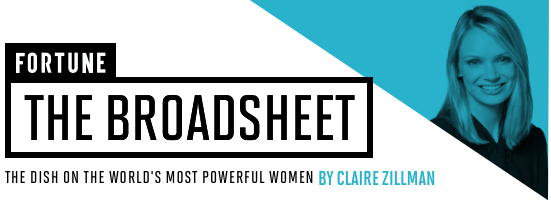
New data from crisis consulting firm Temin and Company finds that last month saw 12 high-profile allegations. That’s the lowest monthly total since claims against movie mogul Harvey Weinstein ignited the #MeToo movement in the fall of 2017 and a dramatic drop from a peak of 143 last October.
In explaining the trend, Davia Temin, the consultancy’s CEO, cited a few factors: a backlash against the movement, more sophisticated campaigns to counter accusations, and improved corporate resources that are placating the aggrieved. […read more]
Sexual harassment allegations are down sharply since Harvey Weinstein first accused
Megan Cerullo, CBS News, June 19, 2019
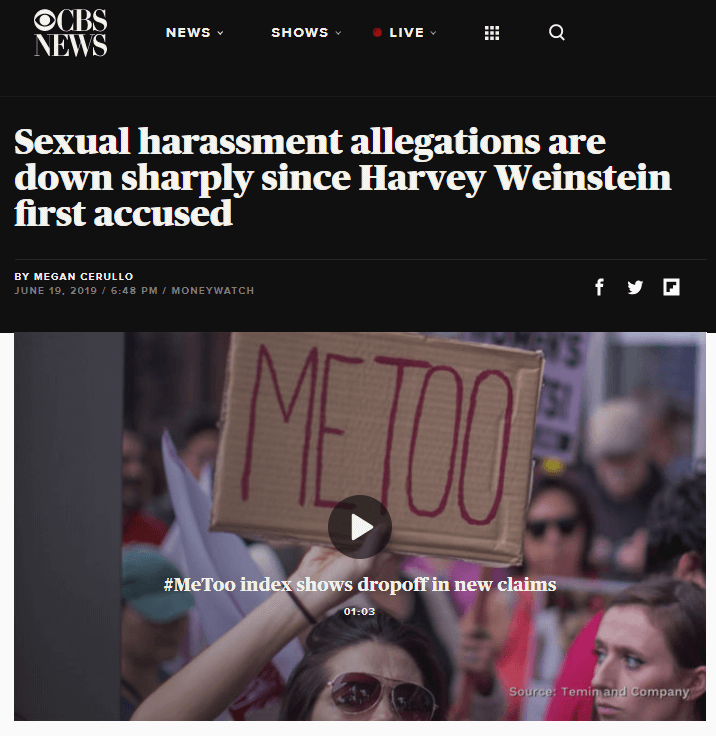
Good news, perhaps, for victims of harassment in the workplace. The number of highly publicized #MeToo accusations dropped to the lowest level last month since peaking in October 2017, when former Hollywood studio chief Harvey Weinstein was first accused of sexual harassment. That’s according to the “#MeToo Index,” which tracks what it calls “high-profile” accusations of sexual misconduct in entertainment, media, politics and other employment sectors.
Twelve such accusations surfaced in May, down from 143 in October 2017, according to Temin and Company, a corporate reputation management and public relations firm that maintains the #MeToo Index. Temin attributes the steep drop in public accusations to a combination of factors, including companies’ improved internal reporting systems and procedures for handling complaints.
“Organizations have become more savvy, so when they hear complaints they are quicker to investigate, address and handle them in some way, as opposed to ignore them,” Davia Temin, the firm’s CEO, said. […read more]
Sexual Harassment Reports in Steep Decline After #MeToo Peak
Jeff Green, Bloomberg, June 17, 2019
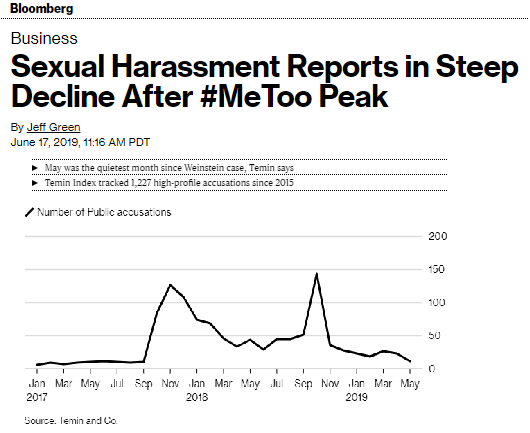
Public accusations of corporate misbehavior and harassment have fallen to their lowest level since October 2017, when allegations against movie producer Harvey Weinstein sparked the #MeToo movement.
Twelve complaints generated media coverage in May compared with a peak of 143 last October, according to data compiled by crisis consultant Temin and Co.
There are lots of reasons the pace of allegations has slowed, said Davia Temin. The initial outpouring included decades worth of historical revelations, clearing a kind of backlog. The news cycle has also moved on, and companies have gotten more sophisticated in the way they manage both bad behavior and negative PR. […read more]
‘A new era’: Trump and 2020 hopefuls are singling out more American companies by name
Jena McGregor, The Washington Post, June 13, 2019
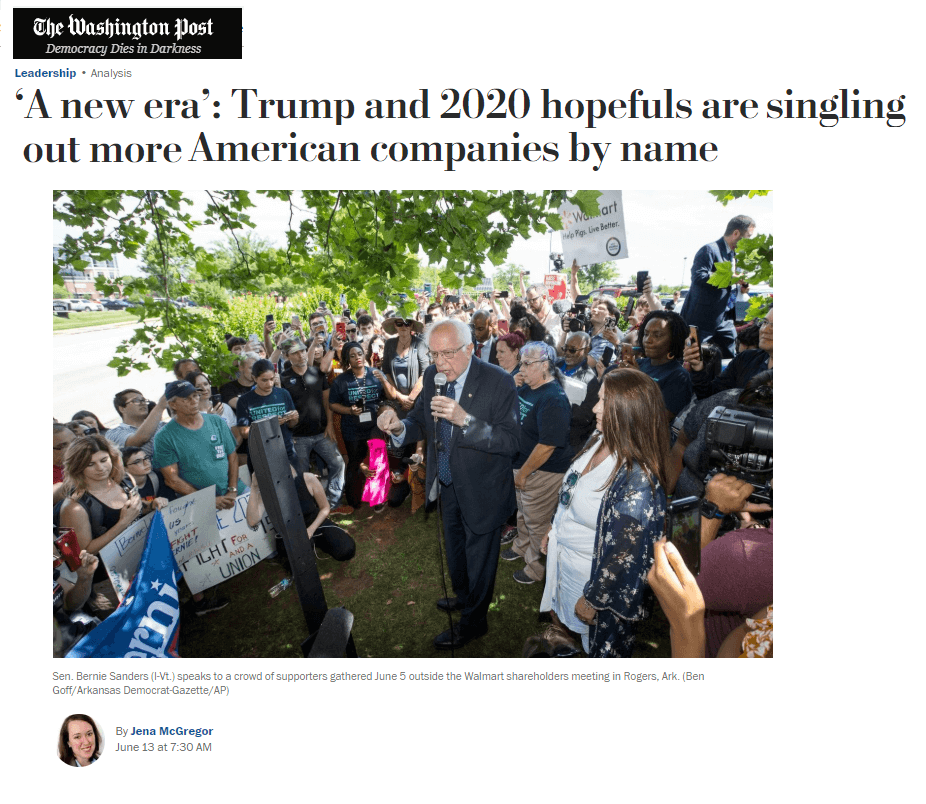
On Monday, after Raytheon and United Technologies announced merger plans, President Trump weighed in again with an opinion about American corporate business decisions, telling CNBC he was “a little concerned” the defense contractor and industrial technology giant’s merger could result in less competition if they become “one big fat beautiful company.” It was the latest in a long string of examples of Trump — whether by tweet or by tirade — singling out American companies.
But the president has been joined more often in recent months by 2020 Democratic presidential candidates who are also increasingly calling out companies by name, directly challenging American businesses in a way that historians and communication experts say underscores a new era.
Communications experts advised companies not to get into Twitter wars, to be responsive but not respond in kind, and to prioritize connecting with White House or legislative staffers early on when making announcements that could come under fire. In most cases, companies should use the opportunity to explain their story or strategy again rather than fight.
“Don’t escalate, don’t shoot back,” said Davia Temin, a communications and management coach on reputation issues. “The last thing an awful lot of people want is a one-upmanship match between the president or presidential candidates and an individual company.” […read more]
The Doyenne of ‘Courage’ in Crisis
Bridget Paverd, PRSA, May 13, 2019

I spent a morning in New York City with Davia Temin last week.
While respectful of the knowledge of others, and always open to learning, there are just so many accomplished professionals that I am seldom blown away meeting a specialized superstar.
Davia is an exception.
Davia and I discussed crisis as we see it now, in 2019…. A world of ‘alternative facts’ and the MeToo movement. We shared war stories. I wanted to write down every word she said – she was so generous with advice. We talked about the value of the truth. And of listening. Of “hearing” both clients and audiences and moving our clients into recovery as quickly as possible.
Davia Temin has shaped, and continues to define, contemporary crisis communication. All of us who work in reputation management have been influenced by her leadership. Even those who don’t know her name follow her best practices. Barely a month goes by that she is not quoted in major media. […read more]
Marketing Lessons From Chase Bank’s Twitter Blowup
Bill Streeter, The Financial Brand, May 9, 2019
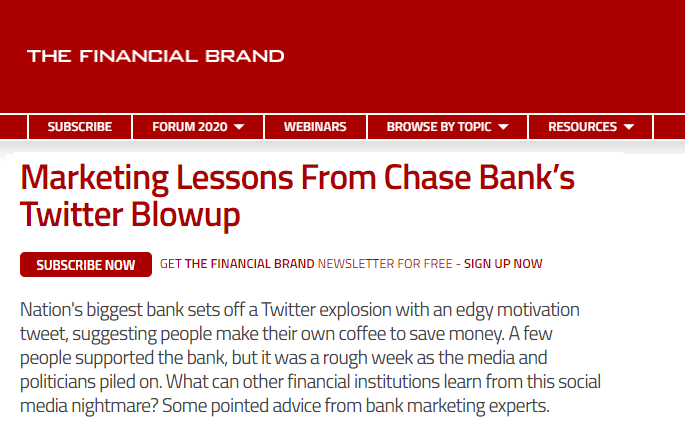
Nation’s biggest bank sets off a Twitter explosion with an edgy motivation tweet, suggesting people make their own coffee to save money. A few people supported the bank, but it was a rough week as the media and politicians piled on. What can other financial institutions learn from this social media nightmare? Some pointed advice from bank marketing experts.
Reputation and crisis-management consultant Davia Temin put it a little more bluntly in response to questions from The Financial Brand: “This was a case of a big bank being targeted and used to make a political point. Politicians pounced on a Chase marketing tweet that was a little Millennial, but essentially harmless.”
“I think the tone for financial institutions — and all of us — needs to be inspirational, aspirational, kind and witty. It’s the best way, and also much harder to attack. I might have suggested a Twitter response that was both light and serious, like this: ‘We clearly must not have had our morning coffee today — we are so sorry, and never meant to offend anyone with our morning tweet. Our goal was only to help suggest ways we can all save on the small things in order to reach big dreams’.” […read more]
Temps at the top
Nancy Marshall-Genzer, Marketplace, April 23, 2019

Right now, the Trump administration has acting heads at the Defense Department, Homeland Security, the Small Business Administration, and the Office of Management and Budget. By the time you finish reading this story, there could be more. And that’s just the way President Trump likes it, as he told CBS’s “Face the Nation” in February.
“I like ‘acting’ because I can move so quickly,” he said. “It gives me more flexibility.”
It’s the kind of flexibility that’s increasingly on display in the private sector. Intel appointed Robert Swan as interim CEO last June. Last month, Wells Fargo announced that its general counsel, C. Allen Parker, would become interim CEO and president. J. Crew, Comscore and Herbalife have also brought on interim CEOs this year.
Davia Temin coaches interim executives. She says they have a tough job.
“You’ve got the title — almost,” she said. “You’ve got the responsibility — almost. You are acting as if you are the CEO, but when it comes to long-term strategy and planning and action and vision and mission, you don’t have that nod.” […read more]
The Fixer
Dora Mekouar, VOA Connect, April 12, 2019
Davia Temin is featured in this Voice of America Connect story with reporting by Dora Mekouar. In this video she shares the story behind her woman-owned crisis and reputation management firm and the different tools firms and people can use when faced with catastrophe. […read more]
Is Wells Fargo stuck in the denial stage of recovery?
Kate Berry, American Banker, April 7, 2019
![]()
Since Wells Fargo’s phony-accounts scandal broke in 2016, the bank’s public and private reactions have diverged significantly.
After an initial bout of blame directed at the thousands of employees who opened the fake accounts in an effort to meet aggressive sales goals, the bank pivoted to a public position of contrition, saying it was dedicated to fixing its corporate culture to ensure nothing like that could happen again. That line was offered by then-CEO Tim Sloan last month when he testified to Congress, in which he said the bank had made significant progress in atoning for its mistakes.
Yet in private, bank executives and many rank-and-file employees have taken the view that the bank’s problems are largely not of its own making and have been overblown by overbearing regulators, scoop-hungry reporters, hostile members of Congress, and a system that has put its actions under an (unfair) microscope.
In short, the bank has appeared to be in denial that it has a problem at all, some argue.
“Denial is one of the hardest issues for a company to address after a crisis,” said Davia Temin, president and CEO of management consulting firm Temin and Company. “It’s not over just because Wells is ready for it to be over.” […read more]
Great Crisis Management is Counter-Intuitive: That’s Why Boeing, Wells Fargo Are Getting It So Wrong
Leadership, “Reputation Matters,” Forbes, April 7, 2019
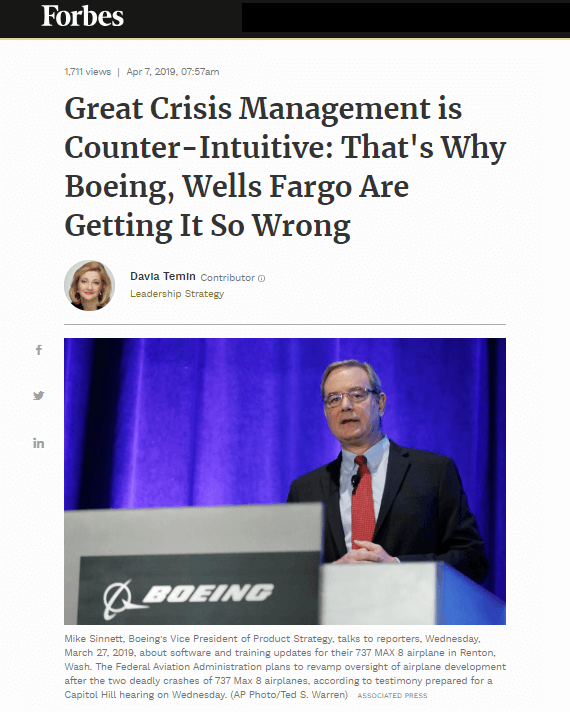
It’s easy to be a Monday morning quarterback, especially for huge companies facing huge problems. But too many companies, like Wells Fargo and Boeing, are getting it all wrong time and time again.
The stakes for their failure – doing the wrong things in crisis and not understanding why – are too high. And consumers, investors, partners, and stakeholders are suffering the consequences. Why the blind spots? Why the inability to get it right when crisis hits?
Why Companies Are Getting Crisis Response So Wrong
The core reason that so many big companies, who should know better, fail in crisis is because the best crisis management is counter-intuitive, sometimes even illogical, and they absolutely do not understand that.
So they listen to the wrong people, consider only partially the impact and ramifications of their actions, ignore emotion or the zeitgeist of the moment, reflexively make the wrong decisions, dig themselves into holes, and then are loathe or incapable of digging themselves out again. […read more]



